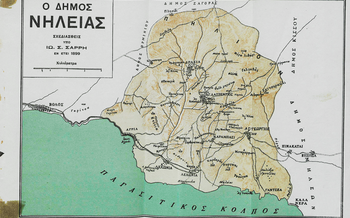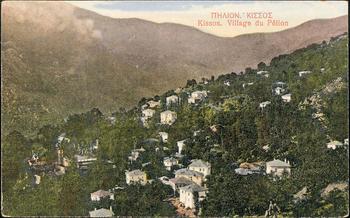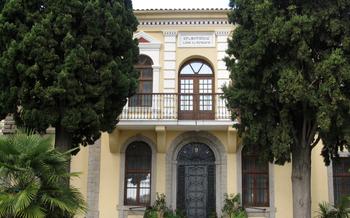
Pieria Olive Oil Museum
- The Pieria Olive Oil Museum: A Journey Through Liquid Gold
- Olive Oil Production in Pieria: A Centuries-Old Tradition
- Interactive Exhibits: A Multisensory Experience
- The Olive Tree Garden: A Symbol of Longevity and Resilience
- Olive Oil Museum Shop: A Treasure Trove of Local Delights
- Guided Tours: Unveiling the Secrets of Olive Oil
- Workshops and Events: Celebrating Olive Oil Culture
- Sustainability and Eco-Friendliness: A Commitment to the Environment
- Accessibility and Facilities: Ensuring a Welcoming Experience
- Beyond the Museum: Exploring Olive Oil Country
- The Olive Oil Museum Experience: A Personal Reflection
- Local Flavors: Olive Oil in Traditional Greek Cuisine
- Olive Oil Health Benefits: A Liquid Elixir of Wellness
- The Olive Oil Museum: A Must-Visit for Food and Culture Enthusiasts
- Insider Tip: Olive Oil Tasting Etiquette
The Pieria Olive Oil Museum: A Journey Through Liquid Gold
The Pieria Olive Oil Museum, nestled in the heart of the picturesque region of Pieria, Greece, is a captivating tribute to the ancient art of olive oil production. Established in 2016, the museum showcases the rich cultural heritage and centuries-old traditions surrounding this liquid gold of the Mediterranean. Located in the city of Katerini, the museum is easily accessible by car or public transportation, inviting visitors to embark on a sensory journey through the world of olive oil.
Upon arrival, visitors are greeted by the museum's impressive exterior, featuring traditional Greek architecture and a serene courtyard adorned with olive trees. Inside, the museum's spacious exhibition halls are designed to provide an interactive and educational experience for visitors of all ages. Get ready to immerse yourself in the fascinating history, production methods, and cultural significance of olive oil in Greece.
Olive Oil Production in Pieria: A Centuries-Old Tradition
Olive oil production in Pieria, nestled between the Aegean Sea and Mount Olympus, is a centuries-old tradition deeply rooted in the region's history and culture. The area's unique microclimate, characterized by mild temperatures, abundant sunshine, and well-drained soil, provides ideal conditions for olive cultivation.
Pieria's olive groves stretch across the fertile plains and hillsides, with olive trees standing as majestic symbols of resilience and longevity. Traditional olive oil production methods, passed down through generations, coexist harmoniously with modern techniques, ensuring the highest quality and sustainability.
In the early days, olives were harvested by hand and pressed using simple stone mills. Today, while modern machinery has streamlined the process, the same dedication to quality remains. Farmers carefully tend to their olive trees throughout the year, using sustainable practices to protect the environment and preserve the delicate balance of nature.
Pieria's olive oil is renowned for its rich, fruity flavor, intense aroma, and vibrant golden-green color. It is a staple ingredient in Greek cuisine, adding a distinctive touch to everything from simple salads and grilled meats to complex stews and pastries.
Interactive Exhibits: A Multisensory Experience
The Pieria Olive Oil Museum invites visitors to engage in a multisensory journey through the world of olive oil. Olive oil tasting is a central activity, allowing visitors to sample a variety of oils and discover their distinct flavors and aromas. Guided by experienced instructors, visitors learn to identify different olive oil characteristics, such as acidity, bitterness, and fruitiness.
Beyond tasting, the museum offers interactive displays that bring the olive oil production process to life. Visitors can witness the transformation of olives into liquid gold through simulated harvesting, pressing, and extraction methods. Educational games and activities for children add an element of fun and engagement, making the museum an ideal destination for families.
The Olive Tree Garden: A Symbol of Longevity and Resilience
In the heart of the Pieria Olive Oil Museum lies a serene oasis, the Olive Tree Garden. This verdant haven serves as a living testament to the enduring legacy of olive trees in Greece. The garden is adorned with an array of olive tree varieties, each possessing unique characteristics that reflect the diverse tapestry of Pieria's olive-growing heritage.
As you stroll through the garden, you'll encounter majestic centuries-old olive trees, their gnarled trunks bearing witness to their resilience and longevity. These venerable giants stand as silent guardians of the land, embodying the unwavering spirit of the Greek people.
Interspersed among the ancient trees are younger saplings, symbolizing the continuity and renewal of olive cultivation in Pieria. These vibrant young trees represent the future of olive oil production, ensuring that the traditions and flavors of this liquid gold endure for generations to come.
The Olive Tree Garden is not merely a botanical showcase; it also holds deep cultural and symbolic significance. In Greek mythology, the olive tree is closely associated with the goddess Athena, who is said to have bestowed it upon the people of Attica as a gift. The olive branch, with its connotations of peace and harmony, has become an enduring symbol of reconciliation and goodwill.
Guided tours of the Olive Tree Garden offer visitors a fascinating glimpse into the symbolism and history associated with these remarkable trees. Experienced guides provide insights into the role of olive trees in Greek mythology, folklore, and religious traditions.
Whether you seek a tranquil oasis to escape the hustle and bustle of everyday life or a deeper understanding of the cultural significance of olive trees, the Olive Tree Garden at the Pieria Olive Oil Museum is a must-visit destination. Let the ancient wisdom and enduring spirit of these venerable trees captivate your senses and leave you with a lasting appreciation for the treasures of Greece.
Olive Oil Museum Shop: A Treasure Trove of Local Delights
The Olive Oil Museum Shop is an alluring haven for anyone seeking to immerse themselves in the world of olive oil. As you step inside, your senses are greeted by the heady aroma of freshly pressed oil, inviting you to explore the exquisite selection of olive oil-based products.
Peruse the shelves lined with artisanal olive oils, each bottle a testament to the dedication and craftsmanship of local producers. From delicate extra virgin olive oils to robust, full-flavored varieties, there's a bottle to suit every palate. Take your time to savor the nuances of each oil, reading the tasting notes and learning about the unique characteristics of each variety.
Beyond olive oil, the shop offers a captivating array of local crafts and souvenirs inspired by the olive oil tradition. Discover intricately carved olive wood bowls, hand-woven linens adorned with olive motifs, and ceramic tableware designed to enhance the enjoyment of olive oil-infused dishes.
To deepen your understanding of olive oil and its culinary potential, join one of the regular tasting sessions hosted by the museum's knowledgeable staff. Learn how to identify high-quality olive oil, appreciate its diverse flavors, and incorporate it into your own cooking. Whether you're a seasoned olive oil enthusiast or just beginning your journey into the world of liquid gold, the Olive Oil Museum Shop promises a delightful and enriching experience.
Guided Tours: Unveiling the Secrets of Olive Oil
To fully immerse yourself in the world of olive oil, consider booking a guided tour of the Pieria Olive Oil Museum. Knowledgeable guides will accompany you through the exhibits, providing in-depth insights into the history, production, and cultural significance of olive oil. They will explain the traditional and modern methods of olive oil extraction, share fascinating stories about the role of olive oil in Greek mythology and symbolism, and answer any questions you may have.
Guided tours are available for both groups and individuals, and can be customized to suit your interests and time constraints. Advance booking is recommended to secure your spot, especially during peak tourist season. Whether you're a casual visitor or a passionate olive oil enthusiast, a guided tour will elevate your experience at the Pieria Olive Oil Museum and leave you with a deeper appreciation for this liquid gold.
Workshops and Events: Celebrating Olive Oil Culture
The Pieria Olive Oil Museum is not just a place to learn about the history and production of olive oil; it's also a vibrant hub for cultural events and educational programs. Throughout the year, the museum hosts a variety of workshops, cooking classes, and seminars that celebrate olive oil culture and provide opportunities for hands-on learning.
One of the most popular workshops is the olive oil tasting experience, where participants learn how to properly taste and evaluate different olive oils. Under the guidance of experienced instructors, visitors explore the nuances of flavor, aroma, and texture, learning to identify high-quality olive oil and appreciate its unique characteristics.
For those interested in learning more about the culinary applications of olive oil, cooking classes are offered on a regular basis. Led by expert chefs, these classes teach participants how to incorporate olive oil into a variety of dishes, from classic Greek recipes to modern fusion cuisine.
In addition to workshops and cooking classes, the museum also hosts cultural events, festivals, and exhibitions dedicated to olive oil. These events provide a platform for local producers to showcase their products, while visitors can enjoy live music, traditional dances, and other cultural performances.
Whether you're a food enthusiast, a culture buff, or simply someone who wants to learn more about olive oil, the Pieria Olive Oil Museum offers a range of workshops and events that are sure to enrich your visit. Advance booking is recommended to secure your spot, as these programs often sell out quickly.
Sustainability and Eco-Friendliness: A Commitment to the Environment
The Pieria Olive Oil Museum is committed to sustainable practices, recognizing the importance of preserving the environment for future generations. The museum operates using renewable energy sources, such as solar and wind power, to minimize its carbon footprint. Eco-friendly materials are used throughout the museum, from the construction to the exhibits, to reduce waste and promote sustainability.
Educational programs are conducted at the museum to raise awareness about environmental issues related to olive oil production. Visitors learn about the importance of sustainable farming practices, water conservation, and waste reduction. Through these programs, the museum encourages visitors to adopt eco-friendly habits in their own lives.
The museum's commitment to sustainability extends beyond its walls. It actively collaborates with local olive growers and producers to promote sustainable practices in the region. Through partnerships and educational initiatives, the museum helps to ensure that Pieria's olive oil industry remains environmentally friendly and sustainable for years to come.
Accessibility and Facilities: Ensuring a Welcoming Experience
The Pieria Olive Oil Museum is committed to providing a welcoming and accessible experience for all visitors. The museum is wheelchair accessible, with ramps and elevators ensuring smooth movement throughout the premises. Visitors with disabilities can request assistance from the friendly staff, who are always ready to provide support and guidance.
Families with young children are well-catered for at the museum. A dedicated children's play area offers a safe and fun space for kids to engage in imaginative play while parents explore the exhibits. The museum also provides strollers for rent, making it easier for families to navigate the museum with ease.
On-site parking is available for visitors, ensuring a convenient and hassle-free visit. The museum also features a charming café where visitors can relax and enjoy a delicious meal or a refreshing beverage surrounded by the serene ambiance of the olive groves.
Beyond the Museum: Exploring Olive Oil Country
The Pieria Olive Oil Museum offers a fascinating glimpse into the world of olive oil production, but to fully immerse yourself in the olive oil culture of the region, venture beyond the museum walls and explore the surrounding countryside.
Olive Groves and Oil Mills:
Arrange a visit to one of the many olive groves in the Pieria region. Stroll amidst the silvery-green trees, learn about different olive varieties, and witness the traditional harvesting methods. Many olive groves also offer guided tours and tastings, providing an opportunity to sample freshly pressed olive oil.
Local oil mills are another must-visit. Witness the transformation of olives from fruit to liquid gold as you learn about the extraction process. Most oil mills have a shop where you can purchase freshly pressed olive oil, often at a fraction of the cost you would pay in stores.
Olive Oil-Themed Routes:
Explore the region on foot or by bike, following olive oil-themed routes that take you through picturesque villages, olive groves, and ancient olive trees. These routes offer a chance to admire the stunning landscapes of Pieria while learning about the region's olive oil heritage.
Olive Oil-Infused Cuisine:
Indulge in the culinary delights of Pieria, where olive oil is an essential ingredient in many traditional dishes. Visit local tavernas and restaurants to sample olive oil-infused delicacies such as grilled octopus with olive oil and lemon, horiatiki salad topped with a generous drizzle of olive oil, and freshly baked bread dipped in extra virgin olive oil.
The Olive Oil Museum Experience: A Personal Reflection
As a travel blogger with a passion for culinary exploration, my visit to the Pieria Olive Oil Museum was an unforgettable experience. From the moment I stepped into the museum, I was captivated by the aroma of freshly pressed olive oil that permeated the air. The interactive exhibits offered a fascinating journey through the history, culture, and production of this liquid gold, providing insights into the deep-rooted connection between olive oil and Greek heritage.
One of the highlights of my visit was the olive oil tasting session. Guided by an expert, I learned how to properly taste and evaluate olive oil, discerning its unique flavors and aromas. The variety of olive oils showcased the diverse characteristics of Pieria's olive groves, each with its own distinct personality.
Beyond the museum's educational value, I was struck by the warmth and hospitality of the staff. They were passionate about sharing their knowledge of olive oil and eager to answer any questions I had. Their enthusiasm was contagious, and I left the museum feeling inspired to incorporate more olive oil into my own cooking and lifestyle.
Local Flavors: Olive Oil in Traditional Greek Cuisine
Olive oil is not just a condiment in Greek cuisine; it is an integral part of the culinary landscape. Its rich, fruity flavor and health benefits make it a staple ingredient in a wide variety of dishes, from simple salads and grilled meats to complex stews and pastries.
One of the most popular ways to enjoy olive oil in Greece is in a simple salad. Freshly picked tomatoes, cucumbers, and onions are tossed with a generous drizzle of olive oil, a sprinkle of salt and pepper, and a squeeze of lemon juice. This simple dish is a testament to the power of fresh, high-quality ingredients.
Olive oil is also a key ingredient in many traditional Greek dishes, such as moussaka, pastitsio, and spanakopita. Moussaka is a layered casserole made with eggplant, potatoes, ground lamb or beef, and a creamy béchamel sauce. Pastitsio is a similar dish made with pasta instead of eggplant. Spanakopita is a savory pie filled with spinach, feta cheese, and herbs, all bound together with olive oil.
If you are looking for a way to incorporate more olive oil into your own cooking, there are endless possibilities. You can use it to dress salads, drizzle it over grilled vegetables, or use it to sauté meats and fish. You can also add it to soups, stews, and sauces for a boost of flavor and richness.
No matter how you choose to use it, olive oil is a versatile and delicious ingredient that can add a touch of Greece to any dish.
Olive Oil Health Benefits: A Liquid Elixir of Wellness
The Pieria Olive Oil Museum also highlights the remarkable health benefits associated with olive oil consumption. Scientific research has consistently shown that olive oil, particularly extra virgin olive oil, is a liquid elixir of wellness. Its high content of monounsaturated fatty acids, antioxidants, and polyphenols contributes to a myriad of health-promoting effects.
Olive oil has been linked to a reduced risk of cardiovascular diseases, including heart attacks and strokes, thanks to its ability to lower LDL (bad) cholesterol levels and increase HDL (good) cholesterol levels. It also possesses anti-inflammatory properties that help protect against chronic diseases such as arthritis and certain types of cancer.
Furthermore, olive oil is an essential component of the Mediterranean diet, which is renowned for its health benefits. This diet emphasizes the consumption of plant-based foods, including olive oil, fruits, vegetables, whole grains, and legumes, along with moderate amounts of fish and dairy products. The Mediterranean diet has been associated with a lower incidence of obesity, heart disease, type 2 diabetes, and certain types of cancer.
Incorporating olive oil into a healthy lifestyle is simple. Use it as a salad dressing, drizzle it over grilled vegetables, or add it to your favorite pasta dishes and sauces. You can also use it as a marinade for meats and fish, or simply enjoy it on its own with some crusty bread.
By embracing the culinary and health benefits of olive oil, you can unlock a world of flavor and well-being. So next time you're in the kitchen, reach for a bottle of extra virgin olive oil and experience the transformative power of this liquid gold.
The Olive Oil Museum: A Must-Visit for Food and Culture Enthusiasts
The Pieria Olive Oil Museum is a must-visit destination for anyone passionate about food and culture. It offers a unique opportunity to delve into the rich history, production methods, and cultural significance of olive oil, a liquid gold that has been an integral part of Greek cuisine and culture for centuries. Through interactive exhibits, guided tours, workshops, and events, the museum provides a comprehensive and engaging journey into the world of olive oil.
For food enthusiasts, the museum is a treasure trove of knowledge and experiences. Visitors can learn about the different olive varieties grown in Pieria, the traditional and modern methods of olive oil production, and the health benefits associated with consuming this liquid gold. Interactive exhibits allow visitors to taste and compare different olive oils, while cooking classes and workshops provide hands-on experiences in incorporating olive oil into delicious dishes.
Beyond its culinary significance, the museum also offers a glimpse into the cultural and historical importance of olive oil in Greece. The Olive Tree Garden showcases the resilience and longevity of olive trees, which have been revered in Greek mythology and symbolism for centuries. Guided tours provide insights into the role of olive oil in Greek traditions, rituals, and everyday life.
Overall, the Pieria Olive Oil Museum is a must-visit destination for anyone interested in exploring the culinary and cultural heritage of Greece. It offers a unique and immersive experience that celebrates the liquid gold of the Mediterranean and its enduring significance in Greek society.
Insider Tip: Olive Oil Tasting Etiquette
Olive oil tasting is an art form that requires certain techniques and knowledge to fully appreciate the flavors and nuances of this liquid gold. Here are some insider tips to enhance your olive oil tasting experience:
-
Swirl and sniff: Before taking a sip, gently swirl the oil in your glass to release its aromas. Take a deep sniff to appreciate the complex scents, which can range from fruity and floral to spicy and herbaceous.
-
Small sips: Take small sips of the oil, allowing it to coat your entire palate. This will help you perceive the full flavor profile, including bitterness, pungency, and sweetness.
-
Breathe out: After each sip, exhale through your nose to release the aromas and enhance the taste. This will help you identify the different flavor notes and how they linger in your mouth.
-
Compare and contrast: Taste different olive oils side by side to compare their flavors and characteristics. Pay attention to the differences in color, texture, and intensity.
-
Bread or crackers: Use plain bread or crackers to cleanse your palate between different oils. This will help you avoid flavor carryover and allow you to fully appreciate each oil.




